1. FC Schweinfurt 05
1. Fussball-Club Schweinfurt 1905, Verein für Leibesübungen e.V., called 1. FC Schweinfurt 05, Schweinfurt 05, or simply FC 05, is a German association football club established in Schweinfurt (Bavaria) in 1905. It has sections for netball, fistball, field hockey, badminton, gymnastics, rugby, American football, futsal, and athletics.
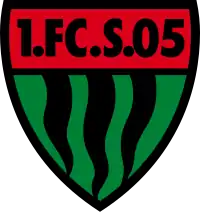 | ||||
| Full name | 1. Fussball-Club Schweinfurt 1905, Verein für Leibesübungen e.V. | |||
|---|---|---|---|---|
| Nickname(s) | Die Schnüdel Die Grün-Weißen | |||
| Founded | 5 May 1905 | |||
| Ground | Willy-Sachs-Stadion | |||
| Capacity | 15,060[1] (860 seated) | |||
| Chairman | Markus Wolf | |||
| Manager | Tobias Strobl | |||
| League | Regionalliga Bayern (IV) | |||
| 2018–19 | 4th | |||
| Website | Club website | |||
|
| ||||
The club is well known due to successful years in top and second-tier football leagues from the 1930s to the 1970s, and thanks to outstanding individuals. During the late 1930s, Schweinfurt's midfielders Albin Kitzinger and Andreas Kupfer, today considered as two of the best half-back players of all time,[2][3] formed the core of the Germany national football team and represented their country at the 1938 FIFA World Cup and within the premiere FIFA continent selection Europe XI.[4][5]
The FC 05 first team, which competes in the tier-four Regionalliga Bayern since the 2013–14 season, is organized within 1. FC Schweinfurt 1905 Fußball GmbH.[6] The club plays its home games at Willy-Sachs-Stadion in Schweinfurt.[7]
History
Early years: 1905–1931
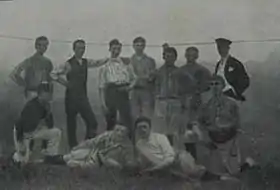
At a time when football became more and more popular among broad levels of the population, 1. Fussball-Club Schweinfurt 1905 was founded on 5 May 1905 by a group of sports enthusiasts. The club's first chairman, Pepi Popp, designed the still unchanged FC 05 crest.[8]
The new team played in various local leagues until beginning of the First World War. The home games were held at Hutrasen south of river Main, the later venue of local competitor VfR 07 Schweinfurt. In 1919, Schweinfurt 05 had to move to a new court near Ludwigsbrücke and became member of the tier-one Kreisliga Nordbayern, but relegated after its first season. The team attempted a merger with Turngemeinde Schweinfurt von 1848, which lasted from 1921 to 1923, before the two groups parted ways again and the football division became 1. Fussball-Club Schweinfurt 1905, Verein für Leibesübungen e.V.[6]
While FC 05 did not reap the expected benefits from the brief union, it improved dramatically after re-establishing itself as an independent club. Membership grew significantly and a number of new sports departments were formed within the organization. The football team yielded its first fruits in 1927 by winning the Unterfranken Cup championship,[8] and in 1931, when it became Kreisliga Unterfranken champion.[9]
Years of excellence: 1931–1963
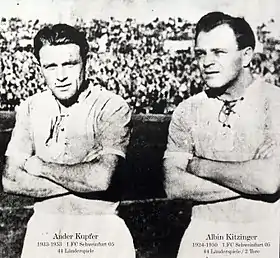
Schweinfurt 05 finally gained first class status again with its entry into the Bezirksliga Bayern in 1931. After introduction of the Gauliga system in 1933, the club became member of the top-flight Gauliga Bayern thanks to finishing 3rd in Bezirksliga Bayern Nord. In addition, the team succeeded in winning the 1933 Bavarian Cup championship, but lost 1–2 to VfB Stuttgart in the subsequent Southern German Cup final.[8]
The club experienced an era of successful seasons in the Gauliga years, winning the Gauliga Bayern in 1939 and 1942, and qualifying for the German football championship round. In the German football championship 1939 competition, Schweinfurt barely missed the semi-final qualification games after three wins in the group stage, where it defeated later 1943 and 1944 German champion Dresdner SC 1–0 in the first leg, but then lost to Dresden 0–1 in the decisive away match.[10] The team failed in the round of 16 of the 1942 German football championship after a 1–2 loss to SG SS Straßburg.
Schweinfurt made a semi-final appearance in the 1936 Tschammerpokal, when it was narrowly defeated 2–3 by FC Schalke 04, the closest it ever came to winning a national title. Again in 1936, the club moved into its newly constructed stadium, the Willy-Sachs-Stadion, a donation by local industrialist and patron Willy Sachs.[11]
At that time, FC 05 midfielders Albin Kitzinger and Andreas 'Ander' Kupfer became renowned in international football as they formed one of the best half-back duos in Europe. Kitzinger distinguished himself with assuredness on the ball and the calmness in which he distributed the ball. Kupfer was a player that fascinated the crowds with his elegant ways of playing. He was a master of kicking the ball with just moving his ankle joint.[12] Kitzinger and Kupfer were an essential part of the famous Germany national team who defeated Denmark 8–0 in Breslau on 16 May 1937.[2] One year later they competed at the 1938 FIFA World Cup in France, and were both called up to represent Germany within the FIFA selection Europe XI in the FA 75th anniversary game against England at Highbury in London.
Due to the Second World War, Schweinfurt 05 merged with Luftwaffen SV Schweinfurt into KSG Schweinfurt for the 1943–44 and 1944–45 Gauliga seasons.[13] The club temporarily had been dissolved in May 1945 under pressure from the occupying powers.[8]
After World War II, the re-established 1. FC Schweinfurt 05 was integrated into the tier-one Oberliga Süd, which, for the first time in German football, introduced the system of contract players in August 1948.[14] The club stayed in the Oberliga for the duration of the league's existence until the Bundesliga, Germany's new professional league, was founded in 1963. Schweinfurt reached the round of the last sixteen of the 1954–55 DFB-Pokal, where it lost 0–1 in the replay against FC Schalke 04 after a 1–1 draw in the first match. On the occasion of the club's 50th anniversary in 1955, Schweinfurt could demonstrate its level when the team defeated German champion Rot-Weiss Essen 3–1, and achieved a 1–1 draw against Everton F.C. from English Football League First Division.[8] The club made it into the 1957 and 1958 Southern German Cup finals and lost both times, to FC Bayern München and to VfB Stuttgart, respectively.[8]
In 1950, Andreas Kupfer became the first captain of the West Germany national football team in his very final 44th appearance. FC 05 goalkeeper Günter Bernard earned two West Germany caps in 1962, before he joined Bundesliga founding member SV Werder Bremen one year later, and was named in Germany's squad for the 1966 FIFA World Cup.
Second tier years: 1963–1976
1. FC Schweinfurt 05 was one of 46 West German football clubs that applied for admission to the newly established Bundesliga in 1963. However, based on the Oberliga Süd score of its past 12 seasons, the club finally did not qualify for the new league, and thus found itself playing in the second tier Regionalliga Süd.
In the 1965–66 season, Schweinfurt became Southern German Regionalliga champion and made it to the Bundesliga advancement games. Here, the team missed to ascend to the top tier after it was unable to prevail in its qualification group with 1. FC Saarbrücken, FC St. Pauli, and promoted winner Rot-Weiss Essen.
With the introduction of the 2. Bundesliga in 1974, Schweinfurt was founding member of the southern division despite only finishing 15th in the last Regionalliga year. For its first 2. Bundesliga season in 1974–75, the club signed-up former national team striker and Bundesliga top scorer Lothar Emmerich. The team earned an excellent third place and barely missed the advancement games for promotion to Bundesliga.
Yo-yo years: 1976–2016
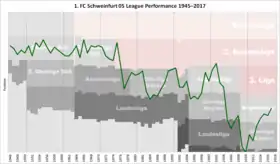
After the 1974–75 season, FC 05 began to falter: poor results and financial problems saw the club descend first to the Bayernliga (III) and then, for the first time in 1983, to the Landesliga Bayern-Nord (IV). Schweinfurt 05 became a yo-yo club ascending and descending between tiers III and IV, with just a pair of brief 2. Bundesliga appearances in 1990–91 and in 2001–02.
As 1989–90 Bayernliga champion the club prevailed in the advancement games to 2. Bundesliga, but was not able to keep pace in the new league. The year before, the team had made it into the last sixteen of the 1989–90 DFB-Pokal, where it lost 0–2 to Eintracht Braunschweig. In 2001, Schweinfurt was promoted to 2. Bundesliga after finishing 3rd in Regionalliga Süd. The team's third place finish was enough to let them skip past the amateur side of VfB Suttgart, who were not allowed to advance a second side to the professional ranks. Despite of a decent first half of the tier-two season, FC 05 finally could not avoid relegation after one year.
Disasters happened in 2004 when FC Schweinfurt 05 was forced to leave the Regionalliga Süd (III) because of financial reasons, and in 2005 when the club went bankrupt. The results in the Bayernliga (IV) were annulled, and the team was relegated to the fifth tier Landesliga.
A re-structured club successfully worked its way back into Bayernliga in 2007. After it was relegated again to the now tier-six Landesliga in 2009, the team returned to the Bayerliga immediately the following year. At the end of the 2011–12 season Schweinfurt managed to qualify for the promotion round to the new Regionalliga Bayern (IV) and advanced to the second round, where the team missed out on promotion.[15] The club finally earned direct promotion to tier-four Regionalliga Bayern in the 2012–13 season by taking the championship in the Bayernliga northern division. Schweinfurt's first three Regionalliga years, however, were characterized by a permanent but successful struggle against relegation.[16]
Recent years: 2016–today
_by_Sandro_Halank%E2%80%93100.jpg.webp)
In 2016, the FC 05 first team was spun off into 1. FC Schweinfurt 1905 Fußball GmbH. By means of the reorganization, the club again established professional structures that shall pave the way back to higher leagues.[6][17]
Schweinfurt actually experienced an upturn in the 2016–17 season and finished 8th in Regionalliga Bayern. In addition, the team succeeded in winning the Bavarian Cup after a 1–0 victory over SV Wacker Burghausen in the final,[18] combined with qualification for the 2017–18 DFB-Pokal first round.
In the 2017–18 Regionalliga, Schweinfurt's ambitioned team was not able to jeopardize the championship of TSV 1860 München. The club finally finished 3rd, where striker Adam Jabiri became Regionalliga Bayern top scorer (28 goals). 1. FC Schweinfurt 05 defeated 2. Bundesliga club SV Sandhausen 2–1 in the 2017–18 DFB-Pokal first round,[19] but then lost 0–4 to later cup winner SG Eintracht Frankfurt.[20] In the same season, Schweinfurt 05 successfully defended the Bavarian Cup after a 3–1 victory over league competitor SpVgg Oberfranken Bayreuth in the final.
Despite the objective of the 2018–19 Regionalliga championship and promotion to 3. Liga, Schweinfurt clearly missed this chance and finished 4th end of the season. In the 2018–19 DFB-Pokal first round, the team with former European U-17 Champion Florian Trinks lost 0–2 to previous season's Bundesliga runner-up and 2018–19 UEFA Champions League competitor FC Schalke 04.[21][22]
Honours
League
Youth
|
Cup
|
Seasons
First team
The season-by-season performance of the club from 1931 until today:[23][24]
|
|
- The 1944–45 Gauliga Bayern season operated in five regional divisions. It is unknown whether any of the season's games were played in the Lower Franconia (German: Unterfranken) division.
- With the introduction of the Bezirksoberligas in 1988 as the new fifth tier, below the Landesligas, all leagues below dropped one tier. With the introduction of the Regionalligas in 1994 and the 3. Liga in 2008 as the new third tier, below the 2. Bundesliga, all leagues below dropped one tier. With the establishment of the Regionalliga Bayern as the new fourth tier in Bavaria in 2012 the Bayernliga was split into a northern and a southern division, the number of Landesligas expanded from three to five and the Bezirksoberligas were abolished. All leagues from the Bezirksligas onward were elevated one tier.
- The 2020–21 Regionalliga Bayern season has been cancelled due to the COVID-19 pandemic in Germany, and the original 2019–20 season was extended until spring 2021. In July 2020, the current league leader Türkgücü München was promoted to the 3. Liga and thus suspended from 2019–21 Regionalliga Bayern, and the club's league results have all been annulled.
Reserve team
The recent season-by-season performance of the U23 reserve. After the 2017−18 season, the team had been pulled out from future league participation.[25]
| Season | Division | Tier | Position |
| 2011–12 | Kreisliga Schweinfurt 1 | VIII | 9th |
| 2012–13 | Kreisliga Schweinfurt 1 | 1st ↑ | |
| 2013–14 | Bezirksliga Unterfranken-Ost | VII | 1st ↑ |
| 2014–15 | Landesliga Bayern-Nordwest | VI | 5th |
| 2015–16 | Landesliga Bayern-Nordwest | 3rd | |
| 2016–17 | Landesliga Bayern-Nordwest | 1st ↑ | |
| 2017–18 | Bayernliga Nord | V | 16th ↓ |
German football championship appearances
The club's appearances in German football championship competitions:[26][27]
| Season | Round | Date | Home | Away | Result | Attendance |
| 1939 | Group stage | 10 April 1939 | Warnsdorfer FK | 1. FC Schweinfurt 05 | 1–4 | 4,000 |
| 16 April 1939 | 1. FC Schweinfurt 05 | Dresdner SC | 1–0 | 15,000 | ||
| 30 April 1939 | 1. FC Schweinfurt 05 | Warnsdorfer FK | 4–2 | 6,000 | ||
| 7 May 1939 | Dresdner SC* | 1. FC Schweinfurt 05 | 1–0 | 40,000 | ||
| 1942 | Last sixteen | 24 May 1942 | SG SS Straßburg | 1. FC Schweinfurt 05 | 2–1 | 12,000 |
* Dresdner SC finished top of the group, level on points with Schweinfurt, due to better scoring
DFB-Pokal appearances
The club's appearances in Tschammerpokal (until 1943) and DFB-Pokal:[28][29]
| Season | Round | Date | Home | Away | Result | Attendance |
| 1935 | First round | 1 September 1935 | 1. FC Schweinfurt 05 | SV 08 Steinach | 4–0 | 1,500 |
| Second round | 22 September 1935 | PSV Chemnitz | 1. FC Schweinfurt 05 | 4–2 | 7,000 | |
| 1936 | First round | 14 June 1936 | 1. FC Schweinfurt 05 | FC Hanau 93 | 4–0 | 2,000 |
| Second round | 28 June 1936 | 1. FC Schweinfurt 05 | SV 1898 Feuerbach | 5–2 | 1,500 | |
| Last sixteen | 6 September 1936 | TSG Ulm 1846 | 1. FC Schweinfurt 05 | 2–4 | 3,000 | |
| Quarter-finals | 25 October 1936 | SV Waldhof Mannheim | 1. FC Schweinfurt 05 | 1–2 | 10,000 | |
| Semi-finals | 8 November 1936 | FC Schalke 04 | 1. FC Schweinfurt 05 | 3–2 | 7,000 | |
| 1939 | First round | 20 August 1939 | 1. FC Schweinfurt 05 | SC Wacker Wien | 2–3 (a.e.t.) | 2,500 |
| 1942 | First round | 20 July 1942 | FC Hanau 93 | 1. FC Schweinfurt 05 | 2–1 | 2,000 |
| 1943 | First round | 12 September 1943* | KSG Schweinfurt | 1. FC Nürnberg | 2–4 | 5,000 |
| 1954–55 | First round | 15 August 1954 | Tennis Borussia Berlin | 1. FC Schweinfurt 05 | 2–4 | 20,000 |
| Last sixteen | 26 September 1954 | FC Schalke 04 | 1. FC Schweinfurt 05 | 1–1 (a.e.t.) | 5,000 | |
| 7 October 1954 | 1. FC Schweinfurt 05 | FC Schalke 04 | 0–1† | 7,000 | ||
| 1967–68 | First round | 27 January 1968 | 1. FC Schweinfurt 05 | Eintracht Frankfurt | 1–2 (a.e.t.) | 10,000 |
| 1968–69 | First round | 22 January 1969 | Arminia Hannover | 1. FC Schweinfurt 05 | 4–0 | 3,174 |
| 1971–72 | First round | 4 December 1971 | 1. FC Schweinfurt 05 | Eintracht Frankfurt | 1–0 | 10,000 |
| 15 December 1971 | Eintracht Frankfurt | 1. FC Schweinfurt 05 | 6–1‡ | 3,000 | ||
| 1974–75 | First round | 7 September 1974 | 1. FC Schweinfurt 05 | 1. FC Kaiserslautern | 3–4 | 14,000 |
| 1975–76 | First round | 2 August 1975 | Tennis Borussia Berlin | 1. FC Schweinfurt 05 | 2–0 | 3,000 |
| 1976–77 | First round | 7 August 1976 | 1. FC Schweinfurt 05 | FV Hassia Bingen | 2–3 | 2,000 |
| 1989–90 | First round | 19 August 1989 | 1. FC Schweinfurt 05 | Altonaer FC 93 | 1–0 | 2,100 |
| Second round | 23 September 1989 | 1. FC Schweinfurt 05 | Blau-Weiß 90 Berlin | 4–2 | 6,500 | |
| Last sixteen | 11 November 1989 | 1. FC Schweinfurt 05 | Eintracht Braunschweig | 0–2 | 12,000 | |
| 1991–92 | First round | 27 July 1991 | 1. FC Schweinfurt 05 | SV Waldhof Mannheim | 1–6 | 2,300 |
| 1996–97 | First round | 10 August 1996 | 1. FC Schweinfurt 05 | Hansa Rostock | 2–5 | 5,000 |
| 2002–03 | First round | 30 August 2002 | 1. FC Schweinfurt 05 | 1. FC Union Berlin | 1–2 (a.e.t.) | 2,500 |
| 2017–18 | First round | 13 August 2017 | 1. FC Schweinfurt 05 | SV Sandhausen | 2–1 | 4,610 |
| Second round | 24 October 2017 | 1. FC Schweinfurt 05 | Eintracht Frankfurt | 0–4 | 15,060 | |
| 2018–19 | First round | 17 August 2018 | 1. FC Schweinfurt 05 | FC Schalke 04 | 0–2 | 15,060 |
| 2020–21 | First round | 3 November 2020# | 1. FC Schweinfurt 05 | FC Schalke 04 | 1–4 | 0 |
* Adjourned after the allied air-raid on Schweinfurt on 17 August 1943
† Replay
‡ Eintracht Frankfurt won 6–2 on aggregate
# Originally scheduled on 13 September 2020, but postponed after a legal challenge of Türkgücü München regarding the spot allocated to the representative of the Regionalliga Bayern.[30] Due to the impact of the COVID-19 pandemic in Germany and the organisational effort required to host the fixture, Schweinfurt's home leg was held at Veltins-Arena in Gelsenkirchen, and without spectators
Stadium
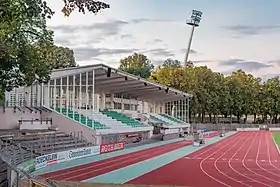
In its first years, 1. FC Schweinfurt 05 played the home games at Hutrasen,[31] the later venue of local competitor VfR 07 Schweinfurt.[32] After the First World War, the club had to move to a court in close proximity, located at Ludwigsbrücke in Schweinfurt. With promotion to Gauliga Bayern in 1933, however, the existing venue proved to be more and more inadequate.
The club's necessity finally motivated local industrialist Willy Sachs to the donation of a football stadium to the City of Schweinfurt, where the patron designated a privileged right of use for FC Schweinfurt 05. The new Willy-Sachs-Stadion,[7] built by German architect Paul Bonatz, was opened on 23 July 1936 in the presence of leading politicians of the Third Reich.[11] The stadium saw its first game three days later with a 2–2 draw between Schweinfurt 05 and 1935 German champion FC Schalke 04.[8] Attandance record was 22,500 at a friendly between Schweinfurt 05 and 1. FC Kaiserslautern in 1954.[33]
Today, Willy-Sachs-Stadion has a capacity of 15,060,[1] where the grandstand hosts 860 covered seats. Besides the football field, the stadium offers track and field facilities, and is equipped with a classical Marathon gate. Premises at the stadium include changing rooms for players, coaches, and referees. Speaker cabins and a press area are available in the grandstand.
The stadium has been renovated and equipped with floodlights in 2001 in order to meet the requirements for 2. Bundesliga. In addition, an electronic scoreboard was contributed by Schweinfurt's large industry. Wavebreakers have been installed on the standing rooms in 2014 to safeguard the stadium's full capacity.[34]
Players
Current squad
Note: Flags indicate national team as defined under FIFA eligibility rules. Players may hold more than one non-FIFA nationality.
|
|
Notable past players
International caps
Germany national football team (Caps/Goals):
 Albin Kitzinger: 44/2
Albin Kitzinger: 44/2 Andreas Kupfer: 44/1
Andreas Kupfer: 44/1 Günter Bernard: 2/0 (3 additional caps for SV Werder Bremen)
Günter Bernard: 2/0 (3 additional caps for SV Werder Bremen)
Europe XI (Caps/Goals):
Non-playing staff
Current management team
- As of 13 January 2021
| Name | Position | Source |
|---|---|---|
| Coaching staff | ||
| Head coach | [35] | |
| Assistant coach | [35] | |
| Assistant coach | [35] | |
| Goalkeeping coach | [35] | |
| Organisation and management | ||
| Director of football | [37] | |
| Medical department | ||
| First team doctor | [35] | |
Managerial history
Head coaches of the club from 1929:[38][39]
| Manager | Start | Finish |
| 1 July 1929 | 30 June 1930 | |
| 1 July 1930 | 30 June 1933 | |
| 1 July 1933 | 30 June 1934 | |
| 1 July 1934 | 30 June 1935 | |
| 1 July 1935 | 30 April 1936 | |
| 1 May 1936 | 30 April 1938 | |
| 1 May 1938 | 30 April 1941 | |
| 1 May 1941 | 30 April 1946 | |
| 1 May 1946 | 30 June 1947 | |
| 1 July 1947 | 30 March 1949 | |
| 1 April 1949 | 30 June 1950 | |
| 1 July 1950 | 30 June 1951 | |
| 1 July 1951 | 31 October 1951 | |
| 1 November 1951 | 31 May 1953 | |
| 1 June 1953 | 30 June 1959 | |
| 1 July 1959 | 30 June 1960 | |
| 1 July 1960 | 31 December 1961 | |
| 1 January 1962 | 31 December 1963 | |
| 1 January 1964 | 30 June 1964 | |
| 1 July 1964 | 30 June 1965 | |
| 1 July 1965 | 15 January 1967 | |
| 16 January 1967 | 30 Juny 1967 | |
| 1 July 1967 | 30 June 1971 | |
| 1 July 1971 | 15 November 1972 | |
| 16 November 1972 | 31 December 1972 | |
| 1 January 1973 | 15 February 1974 | |
| 16 February 1974 | 30 Juny 1974 | |
| 1 July 1974 | 30 June 1975 | |
| 1 July 1975 | 24 February 1976 | |
| 25 February 1976 | 15 May 1976 | |
| 16 May 1976 | 15 October 1976 | |
| 16 October 1976 | 15 October 1978 | |
| 16 October 1978 | 30 Juny 1979 | |
| 1 July 1979 | 30 June 1980 | |
| 1 July 1980 | 15 March 1983 | |
| 16 March 1983 | 30 June 1983 | |
| 1 July 1983 | 15 August 1984 | |
| 16 August 1984 | 31 March 1985 | |
| 1 April 1985 | 15 December 1986 | |
| 16 December 1986 | 30 June 1990 | |
| 1 July 1990 | 12 August 1990 | |
| 13 August 1990 | 22 April 1991 | |
| 23 April 1991 | 30 June 1991 | |
| 1 July 1991 | 17 November 1991 | |
| 18 November 1991 | 30 June 1992 | |
| 1 July 1992 | 31 August 1993 | |
| 1 September 1993 | 15 February 1994 | |
| 16 February 1994 | 14 September 2002 | |
| 18 September 2002 | 18 November 2003 | |
| 19 November 2003 | 30 June 2004 | |
| 1 July 2004 | 15 November 2004 | |
| 16 November 2004 | 2 April 2006 | |
| 3 April 2006 | 30 June 2006 | |
| 1 July 2006 | 16 January 2008 | |
| 17 January 2008 | 30 June 2008 | |
| 1 July 2008 | 30 June 2009 | |
| 1 July 2009 | 19 September 2011 | |
| 20 September 2011 | 30 June 2012 | |
| 1 July 2012 | 30 June 2018 | |
| 1 July 2018 | 5 November 2019 |
Supporters and rivalries
The supporters of Schweinfurt 05 maintain a traditional friendship with the fans of Würzburger FV. They have a distinct hostility with fans of Würzburger FV's local rival FC Würzburger Kickers.[40]
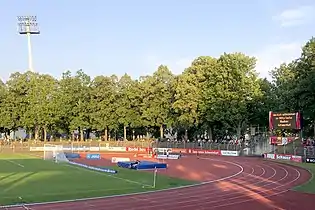 Fans prior to the start of a 2017–18 Regionalliga Bayern match
Fans prior to the start of a 2017–18 Regionalliga Bayern match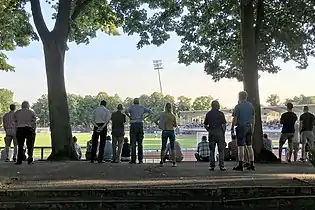 Spectators during a 2017–18 Regionalliga Bayern match
Spectators during a 2017–18 Regionalliga Bayern match_by_Sandro_Halank%E2%80%93512.jpg.webp) Support in the 2018–19 DFB-Pokal
Support in the 2018–19 DFB-Pokal
References
- "Schweinfurter DFB-Pokalspiel ausverkauft" [DFB-Pokal match sold out] (in German). bfv.de. Retrieved 10 October 2017.
- "Breslau Elf Chronicles – Tale of a German Wunderteam". thehardtackle.com. Retrieved 11 September 2017.
- "Eintracht gegen Schweinfurt: Wer sind diese Schnüdel überhaupt?" (in German). fnp.de. Retrieved 27 November 2019.
- "Football Association 75th Anniversary Celebration Match: England 3 Rest of Europe 0". englandfootballonline.com. Retrieved 13 June 2017.
- "1. FC Schweinfurt 05" (in German). schweinfurtfuehrer.de. Retrieved 19 July 2017.
- "1. FC Schweinfurt 05: Geschichte" [1. FC Schweinfurt 05: History] (in German). fcschweinfurt05.de. Retrieved 17 June 2017.
- "Willy-Sachs-Stadion Schweinfurt". youtube.de. Retrieved 24 July 2017.
- "Geschichte des FC 05 Schweinfurt" [FC Schweinfurt 05 History] (in German). schweinfurtfuehrer.de. Retrieved 26 July 2017.
- "Kreisliga Bayern 1931" [1931 Kreisliga Bayern] (in German). fussball-historie.de. Retrieved 10 April 2020.
- "Ehemaliger 05-Torwart Hans Stumpf gestorben" [Former 05 goalkeeper Hans Stumpf passed] (in German). mainpost.de. Retrieved 26 March 2020.
- "Der braune Schatten" [The brown shadow] (in German). cicero.de. Retrieved 25 July 2017.
- Bitter, Jürgen. Deutschlands Fußball-Nationalspieler, Sportverlag, 1997, p. 272.
- "Gauligisten" [Gauliga clubs]. deutscherfussball.info. Retrieved 24 August 2017.
- "Der lange Weg zum Profi" [The long road to professional football] (in German). bpb.de. Retrieved 11 April 2020.
- "Das war die Relegation 2012 auf Verbandsebene" (in German). fupa.net. Retrieved 13 June 2017.
- "FC 05 macht in der Nachspielzeit aus 1:3 noch 4:3 - Relegation!" [FC 05 turns the match within extra time] (in German). mainpost.de. Retrieved 6 September 2020.
- "Legende: 1. FC Schweinfurt 05" [A legend: 1. FC Schweinfurt 05] (in German). zeitspiel-magazin.de. Retrieved 23 August 2018.
- "Schweinfurt 05 gewinnt den Toto-Pokal 2017" [Schweinfurt 05 has won the 2017 Toto Cup]. bfv.de. Retrieved 27 July 2017.
- "DFB-Pokal, 2017/2018, 1. Runde". dfb.de. Retrieved 14 August 2017.
- "DFB-Pokal, 2017/2018, 2. Runde" (in German). dfb.de. Retrieved 25 October 2017.
- "DFB-Pokal, 2018/2019, 1. Runde" (in German). dfb.de. Retrieved 18 August 2018.
- "DFB Cup Men: 1. FC Schweinfurt 05 vs. FC Schalke 04". tv.dfb.de. Retrieved 18 August 2018.
- "Das deutsche Fußball-Archiv" [Historical German domestic league tables] (in German). f-archiv.de. Retrieved 13 June 2017.
- "Fussball.de – Ergebnisse" [Tables and results of all German football leagues] (in German). fussball.de. Retrieved 13 June 2017.
- "Neuausrichtung im Nachwuchsbereich: FC 05 verzichtet auf U23" [Restructuring the junior area: FC 05 gives up U23 team] (in German). fcschweinfurt1905.de. Retrieved 5 June 2018.
- "1. FC Schweinfurt 05, Deutsche Meisterschaft 1938/1939" (in German). dfb.de. Retrieved 7 April 2020.
- "1. FC Schweinfurt 05, Deutsche Meisterschaft 1941/1942" (in German). dfb.de. Retrieved 7 April 2020.
- "DFB-Pokal" (in German). dfb.de. Retrieved 16 August 2017.
- "1. FC Schweinfurt 05: Historische Ergebnisse" [1. FC Schweinfurt 05: Result History] (in German). weltfussball.de. Retrieved 17 August 2017.
- "Pokalstreit: Auch Oberlandesgericht urteilt gegen Türkgücü" (in German). br.de. Retrieved 3 November 2020.
- "Historische Gesamtansichten von Schweinfurt" (in German). schweinfurtfuehrer.de. Retrieved 17 August 2020.
- "Rapid Wien ist längst Vergangenheit: Wieso sich nach dem insolventen VfR 07 Schweinfurt nun auch die FSG vom Spielbetrieb abmeldete" (in German). nuus.de. Retrieved 22 June 2017.
- "Willy-Sachs-Stadion, 1. FC Schweinfurt 05, Fotos & Infos" (in German). stadioncheck.de. Retrieved 1 August 2017.
- "Im Schweinfurter Willy-Sachs-Stadion werden gerade die Wellenbrecher errichtet" [Wavebreakers for the Willy-Sachs-Stadion] (in German). in-und-um-schweinfurt.de. 25 September 2014. Retrieved 20 July 2017.
- "Mannschaftskader 1. FC Schweinfurt 05" [1. FC Schweinfurt 05 Squad] (in German). fcschweinfurt1905.de. Retrieved 2 February 2021.
- "1. FC Schweinfurt 05 1. Mannschaft, Herren" [1. FC Schweinfurt 05: Squad] (in German). fupa.net. Retrieved 2 February 2021.
- "Robert Hettich wird neuer Sportlicher Leiter" [Robert Hettich to become new director of football] (in German). fcschweinfurt1905.de. Retrieved 11 January 2021.
- "1. FC Schweinfurt 05: Trainerhistorie" (in German). weltfussball.de. Retrieved 17 June 2017.
- "1. FC Schweinfurt 05: Die Trainer" [1. FC Schweinfurt 05: Managers] (in German). mainpost.de. Retrieved 29 July 2019.
- "Auseinandersetzungen vorm Derby in Würzburg" [Confrontations prior to the Würzburg derby] (in German). faszination-fankurve.de. Retrieved 10 April 2020.
External links
| Wikimedia Commons has media related to 1. FC Schweinfurt 05. |